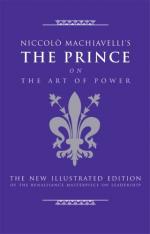|
This section contains 234 words (approx. 1 page at 300 words per page) |

|
Machiavelli's Theory of Power
Summary: In "The Prince," Nicollo Machiavelli writes that political rulers must do whatever they can to accumulate and use power, regardless of whether it's moral or not. Those who don't seek power must strive to be moral and be free from corruption and manipulation.
Nicollo Machiavelli's "The Prince" argues that a tyrannical ruler is the best and most effective ruler. Power is never necessary, and the average layman should not strive to accumulate and wield power directly and exclusively.
For those who do not seek power, taking immoral actions is out of the question; these people must endeavor to lead gracious, generous, and compassionate lives free from corruption or manipulation of other people, even those deemed as "evil." However, the case is very much opposite for people who do have power and the responsibility to use this power to oversee other people. The "ideal" ruler must be an amoral and calculating tyrant capable of unifying his subjects. Empathy is not a valuable trait for rulers. If a leader were to become charitable and congenial, he or she would not be taken seriously; their amiable acts would fall into the insatiable attitudes of...
|
This section contains 234 words (approx. 1 page at 300 words per page) |

|


